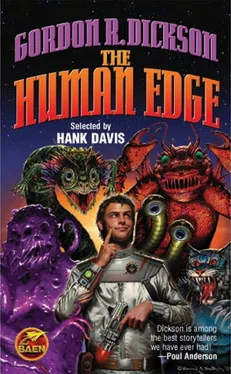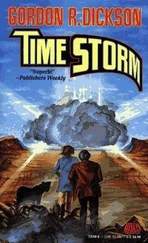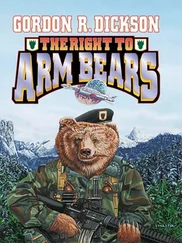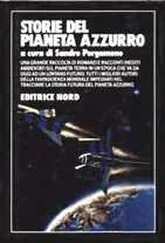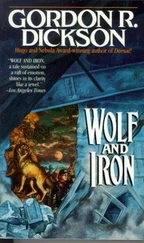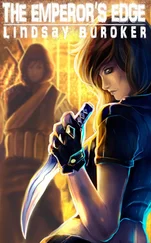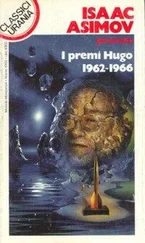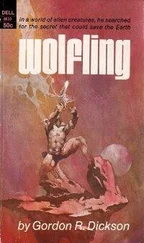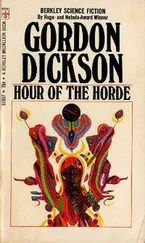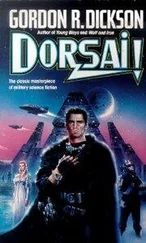The Harrier winked back into normal space.
Her computer had brought her out on the far side of the second planet, which they had not yet surveyed. It was larger than Earth, with somewhat less gravity but a deeper atmospheric envelope. The laser screen picked up the enemy reappearing almost where she had disappeared, near the edge of that atmosphere.
The Harrier winked back all but alongside the other and laid a second five-pound weight through the center of the cylindrical vessel. The other ship staggered, disappeared into no-time and appeared again far below, some five miles above planetary surface in what seemed a desperation attempt to gain breathing time. The Harrier winked after her—and came out within five hundred yards, square in the path of the green beam which it seemed was waiting for her. It opened up the drive and control rooms aft like a red-hot poker lays open a cardboard box.
A few miles below, the surface stretched up the peaks of titanic mountains from horizon to horizon.
“Ram!” yelled the voice of Survey Leader Aspinwall, in warning over the intercom.
The Harrier flung itself at the enemy. It hit like an elevator falling ten stories to a concrete basement. The cylindrical ship broke in half in midair and bodies erupted from it. Then its broken halves and the ruined Harrier were falling separately to the surface below and there was no more time for anyone to look. The clock stood at 13 hrs., 23 minutes and 4 seconds.
The power—except from emergency storage units—was all but gone. As Joe punched for a landing the ship fell angling past the side of a mountain that was a monster among giants, and jarred to a stop. Joe keyed the intercom of the control board before him.
“Report,” he said.
* * *
In the Mapping Section Cal Hartlett waited for other voices to speak before him. None came. He thumbed his audio.
“The whole front part of the ship’s dogged shut, Joe,” he said. “No use waiting for anyone up there. So—this is Number Six reporting. I’m all right.”
“Number Seven,” said another voice over the intercom. “Maury. O.K.”
“Number Eight. Sam. O.K.”
“Number Nine. John. O.K….”
Reports went on. Numbers Six through Thirteen reported themselves as not even shaken up. From the rest there was no answer.
In the main Control Section, Joe Aspinwall stared bleakly at his dead control board. Half of his team was dead.
The time was 13 hours, 30 minutes, no seconds.
He shoved that thought from his mind and concentrated on the positive rather than the negative elements of the situation they were in. Cal Hartlett, he thought, was one. Since he could only have eight survivors of his Team, he felt a deep gratitude that Cal should be one of them. He would need Cal in the days to come. And the other survivors of the Team would need him, badly.
Whether they thought so at this moment or not.
“All right,” said Joe, when the voices had ended. “We’ll meet outside the main airlock, outside the ship. There’s no power left to unseal those emergency bulkheads. Cal, Doug, Jeff—you’ll probably have to cut your way out through the ship’s side. Everybody into respirators and warmsuits. According to pre-survey”—he glanced at the instruments before him—“there’s oxygen enough in the local atmosphere for the respirators to extract, so you won’t need emergency bottles. But we’re at twenty-seven thousand three hundred above local sea-level. So it’ll probably be cold—even if the atmosphere’s not as thin here as it would be at this altitude on Earth.” He paused. “Everybody got that? Report!”
They reported. Joe unharnessed himself and got up from his seat. Turning around, he faced Maury Taller.
Maury, rising and turning from his own communications board on the other side of the Section, saw that the Survey Leader’s lean face was set in iron lines of shock and sorrow under his red hair. They were the two oldest members of the Team, whose average age had been in the mid-twenties. They looked at each other without words as they went down the narrow tunnel to the main airlock and, after putting on respirators and warmsuits, out into the alien daylight outside.
* * *
The eight of them gathered together outside the arrowhead shape of their Harrier, ripped open fore and aft and as still now as any other murdered thing.
Above them was a high, blue-black sky and the peaks of mountains larger than any Earth had ever known. A wind blew about them as they stood on the side of one of the mountains, on a half-mile wide shelf of tilted rock. It narrowed backward and upward like a dry streambed up the side of the mountain in one direction. In the other it broke off abruptly fifty yards away, in a cliff-edge that hung over eye-shuddering depths of a clefted valley, down in which they could just glimpse a touch of something like jungle greenness.
Beyond that narrow clefted depth lifted the great mountains, like carvings of alien devils too huge to be completely seen from one point alone. Several thousand feet above them on their mountain, the white spill of a glacier flung down a slope that was too steep for ice to have clung to in the heavier gravity of Earth. Above the glacier, which was shaped like a hook, red-gray peaks of the mountain rose like short towers stabbing the blue-dark sky. And from these, even as far down as the men were, they could hear the distant trumpeting and screaming of winds whistling in the peaks.
They took it all in in a glance. And that was all they had time to do. Because in the same moment that their eyes took in their surroundings, something no bigger than a man but tiger-striped and moving with a speed that was more than human, came around the near end of the dead Harrier, and went through the eight men like a predator through a huddle of goats.
Maury Taller and even Cal, who towered half a head over the rest of the men, all were brushed aside like cardboard cutouts of human figures. Sam Cloate, Cal’s assistant in the mapping section, was ripped open by one sweep of a clawed limb as it charged past, and the creature tore out the throat of Mike DeWall with a sideways slash of its jaws. Then it was on Joe Aspinall.
The Survey Team Leader went down under it. Reflex that got metal cuffs on the gloves of his warmsuit up and crossed in front of his throat, his forearms and elbows guarding his belly, before he felt the ferocious weight grinding him into the rock and twisting about on top of him. A snarling, worrying, noise sounded in his ears. He felt teeth shear through the upper part of his thigh and grate on bone.
There was an explosion. He caught just a glimpse of Cal towering oddly above him, a signal pistol fuming in one big hand.
Then the worrying weight pitched itself full upon him and lay still. And unconsciousness claimed him.
When Joe came to, his respirator mask was no longer on his face. He was looking out, through the slight waviness of a magnetic bubble field, at ten mounds of small rocks and gravel in a row about twenty feet from the ship. Nine crosses and one six-pointed star. The Star of David would be for Mike DeWall. Joe looked up and saw the unmasked face of Maury Taller looming over him, with the dark outside skin of the ship beyond him.
“How’re you feeling, Joe?” Maury asked.
“All right,” he answered. Suddenly he lifted his head in fright. “My leg—I can’t feel my leg!” Then he saw the silver anesthetic band that was clamped about his right leg, high on the thigh. He sank back with a sigh.
Maury said, “You’ll be all right, Joe.”
The words seemed to trip a trigger in his mind. Suddenly the implications of his damaged leg burst on him. He was the Leader!
Читать дальше
